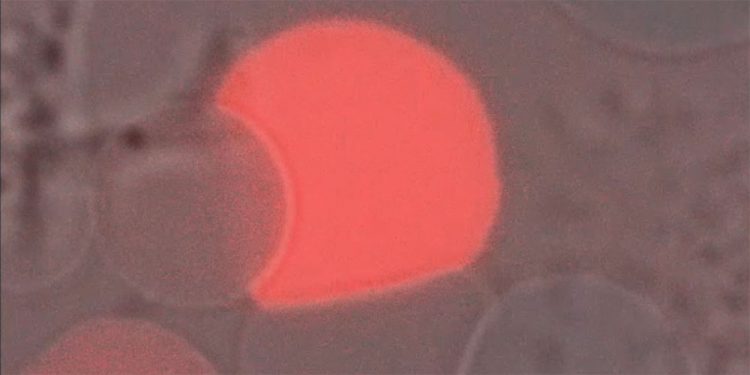Molecular factories: The combination between nature and chemistry is functional

In molecular factories injected into zebrafish embryos, a colour reaction occurs when the trapped enzyme (peroxidase) is working. The researchers thus prove that the combination of synthetic organelles and natural vesicles also works in the living organism. Bild: Universität Basel
Within the cells, the actual biological factories, the molecules of life are assembled. The assembly lines of cells are small compartments called organelles, where a large variety of chemical reactions take place either inside or between them. For medical applications, molecular factories acting as artificial cells would ideally beused – to produce missing or required molecules or drugs.
Soft, synthetic capsules
Collaboration between the Department of Chemistry at the University of Basel, the Swiss Nanoscience Institute, and the NCCR Molecular Systems Engineering made the successful development of such molecular factories possible.
First, researchers led by Professor Cornelia Palivan and Professor Wolfgang Meier designed artificial organelles, that is distinct compartments of cells. They loaded these soft, synthetic capsules with enzymes and equipped them with membrane proteins that act like “gates”. These gates allow molecules involved in the enzymatic reaction to enter and leave the capsule.
Subsequently, the natural cells were feed with these artificial organelles. After stimulation, the cells produced natural micrometer-size vesicles. These possess a natural cell membrane and cytoplasm, enclose the artificial organelles and can therefore function as a molecular factory.
Zebra fish embryos as an animal model
The molecular factories were injected into zebra fish embryos by researchers from the group led by Professor Jörg Huwyler (Pharmazentrum of the University of Basel). In this animal model, they produced the desired compound, which was catalyzed by the enzyme in the artificial organelle. The viability of the animal was not compromised by the injection.
“This combination of natural vesicles and small synthetic organelles is what makes the molecular factory: Reactions that take place inside produce an end product, as also happens inside cells,” explain Dr. Tomaz Einfalt and Dr. Martina Garni, first authors of the paper.
Within the molecular factories, multiple components can be made and assembled into the end product. The biosynthetic vesicles can also transfer components from one cell to the other. Different molecular factories can be combined so that complex structures with high functionality can be created – the first step toward producing artificial cells in the laboratory or in living organisms.
Prof. Dr. Cornelia G. Palivan, University of Basel, Department of Chemistry, phone +41 61 207 38 39, email: cornelia.palivan@unibas.ch
Prof. Dr. Wolfgang P. Meier, University of Basel, Department of Chemistry, phone +41 61 207 38 02, email: wolfgang.meier@unibas.ch
Tomaž Einfalt, Martina Garni, Dominik Witzigmann, Sandro Sieber, Niklaus Baltisberger, Jörg Huwyler, Wolfgang Meier, Cornelia G. Palivan
Bioinspired molecular factories with architecture and in vivo functionalities as cell mimics
Advanced Science (2019), doi: 10.1002/advs.201901923
Media Contact
All latest news from the category: Life Sciences and Chemistry
Articles and reports from the Life Sciences and chemistry area deal with applied and basic research into modern biology, chemistry and human medicine.
Valuable information can be found on a range of life sciences fields including bacteriology, biochemistry, bionics, bioinformatics, biophysics, biotechnology, genetics, geobotany, human biology, marine biology, microbiology, molecular biology, cellular biology, zoology, bioinorganic chemistry, microchemistry and environmental chemistry.
Newest articles

A ‘language’ for ML models to predict nanopore properties
A large number of 2D materials like graphene can have nanopores – small holes formed by missing atoms through which foreign substances can pass. The properties of these nanopores dictate many…

Clinically validated, wearable ultrasound patch
… for continuous blood pressure monitoring. A team of researchers at the University of California San Diego has developed a new and improved wearable ultrasound patch for continuous and noninvasive…

A new puzzle piece for string theory research
Dr. Ksenia Fedosova from the Cluster of Excellence Mathematics Münster, along with an international research team, has proven a conjecture in string theory that physicists had proposed regarding certain equations….



